Ghana


1. Activities (2015- )
| Month/ Year | Places (Prefecture, etc.) | Activities |
| 2024/11/26 | Tsukuba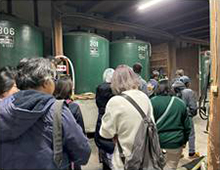 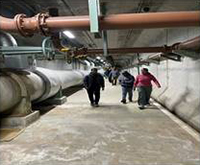 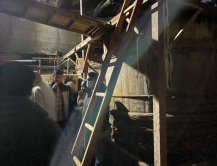 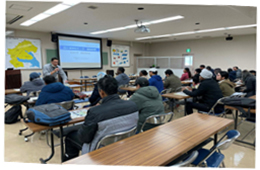 |
The participants visited a water treatment plant, a sake brewery, and a soy sauce brewery in the Kasumigaura Lake region to explore the potential of biotechnology in advancing a sustainable society. During the internship, they learned how biological processes are applied and managed. They also gained insight into agrotourism by studying the rich history of sake and soy sauce fermentation, discovering how these traditions are deeply intertwined with Japanese culture and Have contributed to the local community. |
| 2024/08/10-08/14 | Shanghai (China)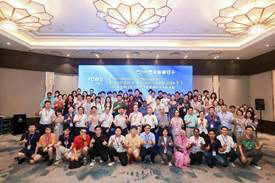 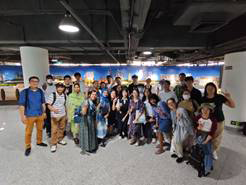 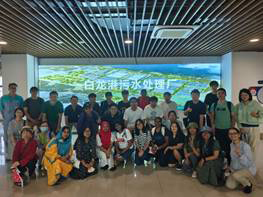 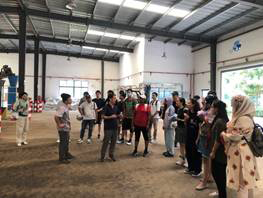 |
From August 10 to 11, the students attended the International Conference on Bioprocess and Sustainability 2024 (ICBS2024) organized by Shanghai Academy of Environmental Sciences, Tongji University, Shanghai University, Tsinghua University, Nankai University, Hainan University and University of Tsukuba. In this conference the students had a good communication with the 18 invited professors and about 300 participants on the advancements of biological processes and their contributions to sustainable development goals (SDGs). In the following three days, the students firstly visited Shanghai Mengqing Theme Park where they acquired the history of water pollution, sewage collection, and management in Shanghai. During the visit to Shanghai Bailonggang Wastewater Treatment Plant (WWTP), the largest WWTP in Asia, the students learned how this largest WWTP treats about one-third of the sewage and sludge produced in Shanghai and gradually improves its sustainability. In Shanghai Qingpu Agricultural Park, they deeply understood how the local farmers environmentally friendly manage their farmland including irrigation system and agricultural wastes with improved crop productivity and quality in the context of SDGs. |
| 2024/07/30-08/01 | Tohoku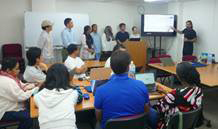 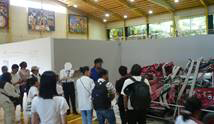 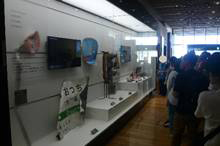 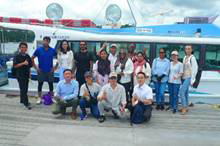 |
The participants visited disaster remains and museums in Miyagi and Iwate Prefectures to learn about the actual damage caused by the earthquake and tsunami of the Great East Japan Earthquake. The participants visited the Matsushima Coast and learned about the importance of tourism resources in the recovery process. Furthermore, they learned about the differences in disaster prevention efforts among various countries. |
| November/2019 | Kita-Kyushu/Yamaguchi |
This domestic field trip gave our students the opportunity to grasp the latest technological innovations in material recycling and energy recovery efforts in Japan. In Kitakyushu Eco-Town students learned about the integrated recycling complex in the Eco-Town Center and then had the practical visits to the PET bottles and cans recycling facilities. In Yamaguchi Kenraku milk factory the students learned about the fermentation of its organic wastes and by products to produce biogas that is subsequently used to produce steam. The steam is then used as energy input into the milk industry. We also visited Shimonoseki incineration facility and material recovery facility where students strengthened their knowledge about integrated waste management. Finally in Sanyo recycling facility the students could learn about the recycling of fish residue. |
| September/2019 | The Netherlands/Germany |
This field trip aimed to enhance JDS Fellows’ knowledge and insights about agricultural practices, disaster management, and water governance in the Netherlands and Germany. In Amsterdam, the Fellows observed water canals that are important part of city planning and economic development. In Haarlem, the Curuquius museum showed the historic water drainage practices. In Delft, the Fellows observed water drainage practices and dairy farms in polders. They also had seminars with graduate students at the Delft University of Technology. The Fellows then visited the unique storm surge barrier called Maeslantkering at the mouth of the Rhine River (picture) to understand the Delta Work of the Netherlands and the importance of flood protection for the economy. The Fellows then visited Rotterdam to observe the environmental restoration of former development sites and floating forests. They presented about their research topics at the Rotterdam University of Science and Technology and interacted with undergraduate students there. In Germany, the Fellows had a seminar and a short tour about flood management and water governance at the Rhine and the Rhine Commission in Koblenz. Then they went downstream to Cologne for more flood protection practices. |
| August/2019 | Kushiro(Hokkaido) |
Participants visited the Kushiro Wetland National Park area, Hokkaido, the first and largest Ramsar site in Japan, to learn sustainable management of the wetland through wise use of natural resources and ecosystem services in tourism, fisheries and so on. Guided by Mr. Hisashi Shinsho, Chair of Kushiro International Wetland Centre Technical Committee, the participants experienced an adventurous wetland walk, trail walk and river canoeing to learn the unique ecosystems including groundwater flow and the meandering river restoration project in Kushiro Wetland. They also learned about local efforts to wise-use natural resources through discussion with Mr. Takeshi Tosa who is a local fisherman, ecotourism operator and devoted conservation practitioner, conservation research and practice of red crown cranes at Akan International Crane Center and rehabilitation and conservation activities for the local endangered raptor species at Institute for Raptor Biomedicine Japan. |
| August/2019 | Okinawa |
Students visited University of the Ryukyus and attended lectures on tropical cyclone observations, forecast, and disaster prevention. Students also had a short campus tour including a meteorological radar system and university museum. On the following day, the students visited Shurijo Castle Park to learn historical background on the Ryukyus with cultural communications with China and surrounding countries. |
| January/2019 | Kushiro(Hokkaido) |
With sustainable management of Kushiro Wetland as a core topic, students learned about conservation and utilization of natural resources for economy and tourism, river restoration, and endangered wildlife conservation in the Kushiro Wetland area through site visits, lectures and discussion by local experts. |
| November/2018 | Malaysia |
Students participated in the 10th Better Air Quality Conference 2018 (International Conference on Air Quality Improvement) in Kuching, Malaysia. Students learned about the current state of atmospheric environmental problems in developing countries, mainly in the Asian region, and the concepts and efforts concerning air quality management technology and policies. In addition to gaining knowledge listening to lectures and presentations by experts, the students nurtured their problem recognition ability and international communication ability through communicating with the participants at the conference sessions. |
| September/2018 | Okinawa |
This field trip is designed to examine the challenges and possibilities of developments in Okinawa. This area has been one of the most popular tourism destinations in Japan with rich cultural, environmental, and historical heritages. FOCUS: (1) the conservation of local ecology and marine ecology; (2) a historical study about the establishment of Ryukyu culture and impact of World War II on the local environment and economy; (3) historical roots of Japanese-Okinawan relations; and (4) possibilities of future tourism in remote areas |
| July/2018 | Liverpool(UK) |
Visit Liverpool, UK, learn about Mercy River campaign, the pioneering environmental symbiosis city policy in the world. Students learned about water management policy and urban development centering on rivers and considered policy application to their country while comparing their case. |
| May/2018 | China | This international internship to China consisted of three parts. (1) Beijing internship: Field trip to Xiaojiahe Wastewater Treatment Plant (Beijing) and the China-Japan Joint Seminar on Water Environment Technology in Tsinghua University. (2) Tianjin internship: Field trip to the Sino-Singapore Tianjin Eco-city and the Symposium on Technological Innovations in Environmental Control and Resources Recovery & Utilization in Nankai University, Tianjin. The two field trips are related with environmental issues and applicable technologies in China, through which the students can know how people are trying their best to make their surroundings more beautiful and sustainable. During the seminars, the students had good chance to communicate with the young generation of scientists and specialists who are contributing themselves to environmental protection and sustainable development in China. (3) 2018 International Students Conference on Environment and Sustainability (ISCES) hosted by the UNEP and Tongji University. The students were offered great opportunities to exchange ideas on the environment and sustainability regarding plastic wastes with fellow students from more than 30 countries. The students also actively participated in the intensive lectures, group discussions, field trips to rural and urban areas, and poster competitions. |
| February/2018 | Kushiro (Hokkaido) |
On the theme of sustainable natural resource utilization, students learned about natural revitalization, tourism use of Kushiro Wetland, rare wildlife conservation in Kushiro Marsh, historical cultural background of nature management, and hotel management using waste heat and agriculture among other topics. |
| February/2018 | Okinawa |
JDS students learned the influence of overuse and climate change on coral reefs, the cultural formation of urban landscape in Okinawa, and the relationship about agriculture and regional promotion. With the cooperation of the University of the Ryukyus, we had the opportunity to attend lectures of researchers at the university and learned the latest research results. |
| February/2018 | Tsukuba (Ibaraki) | Students visited the Center for Genetic Resources, Gene Databank and Agricultural Environment Change Research Center in the Agricultural Research Organization, and learned the latest knowledge on genetic resource recording, preservation technology and soil carbon storage research through lectures and facilities tours. |
| January/2018 | Tokyo | This year JDS students together with 6 professors joined this domestic trip which mainly consisted two activities: (1)visiting to the National Museum of Emerging Science and Innovation; and (2)surverying the Tokyo bay, especially Odaiba, Hinode, and Asakusa areas. All the participants experienced the advancement of technologies for environmental managemnet in Japan, especially on surface water systems and waste disposal, which is beneficial for the students to obtain the real ideas of betterment of the environment. |
| September/2017 | Hokkaido |
We surveyed the Northern part of Hokkaido (Rishiri Island, Sarobetsu Marsh, Daisetsuyama Asahidake etc.) and conducted a survey to preserve the forest and wetland ecosystem. Especially at Hokkaido University Research Forest, we made measurements on the allometry of red-faced Pinea pine trees, of which the existing data is not enough yet. |
| July/2017 | Liverpool(UK) | Mercy River campaign is a pioneering environmental symbiosis in the world. Under the guidance of Professor Peter Batey of Liverpool University, who was the chairperson of this campaign, JDS students were able to gain knowledge about the urban development centering on rivers, water pollution policy and participation process of citizens. |
| March/2017 | Ibaraki | JDS Fellows and SUSTEP students visited Shimizu Farm and learn about small/medium sized farm management, soil production, and larger agricultural concepts from Mr Shimizu. |
| January/2017 | Okinawa | JDS Fellows and SUSTEP students learned about desalination technologies, wetland conservation, coastal development and historical conflicts. |
| January/2017 | Tokyo | JDS Fellows and SUSTEP students visited the water supply museum in Tokyo. They also observed super levee development areas along the Sumida River to better understand Tokyo's water management policies and disaster management. |
| January/2017 | Kushiro (Hokkaido) |
The purpose of the trip was to learn about the lifestyle, industrial activities, biodiversity protection, waste management, and eco-tourism initiatives in Hokkaido, one of coldest area in Japan. In Betsukai town, the study focused on business entities working with dairy farming and biomass utilization. In Kushiro city, our fellows visited Lake Touro, Kushiro wetland and some other sites related to eco-tourism. Through this trip, the students learned about the interlinkages between socio-economic activities and the environment in a cold area. |
| December/2016 | Tokyo |
JDS Fellows and SUSTEP students visited the solid waste treatment system in Tokyo at the Central Breakwater Intermediate and Final disposal facilities and sites. They learned about recycling technologies and future waste management problems in Tokyo. |
| October/2016 | Koga (Ibaraki) | JDS Fellows visited "First Eco Park" and "Dream Factory" of the Sekisui House Corporation in Koga City. This visit was to understand the effort of private companies to build ecologically friendly houses. Fellows learned about newest technologies for "Zero Emission Houses" with the combined use of the newest solar panel system and gas-energy production. They also observed the technologies for disaster adaptation such as the automatic emergency energy supply and rain water collection. The Sekisui House Corporation also has a recycling factory here to collect 100% of its building wastes to be recycled. Through this visit, the Fellows could develop the idea about up-dated technologies for house building that can be useful in developing countries. |
| September/2016 | Sugadaira (Nagano) |
JDS Fellows in the first year and the second year joined this three-day trip to the Sugadaira area in Nagano Prefecture to mainly study about "Satoyama" practices. On the first day, they observed agricultural area of Obuse, where chestnuts and canola oils have been produced. They also observed old Japanese houses here. At night, they received a short lecture on vegetation in the Sugadaira area. On the second day, the Fellows conducted vegetation survey in the Sugadaira area through trekking and discussed about the maintenance of the alpine ecosystem, including the function of high-altitude wetlands. On the third day, the Fellows received lecture and conducted fieldwork about the impact of the increasing deer population on the mountain ecosystem. They also observed tourism and resort expansion in Karuizawa. |
| August- September/2016 |
The Netherlands |
The Fellows participated in the joint seminar between the University of Tsukuba and the Delft University of Technology in the Netherlands. On the first day, the Fellows spent a few hours to discover the roles of the intricate canal system in Amsterdam historically. On the second day, they moved to the town of Delft and had a tour from a Delft University of Technology professor about how waterways played important roles in the development of this city. On the following day, the Fellows participated in in-class seminar and listened to lectures by Delft University of Technology professors and doctoral students about disaster prevention, green development of cities, and water management. In the afternoon, the Fellows made presentations about environmental issues in their countries and exchanged ideas with researchers at Delft. On the fourth day, a representative in urban planning from the Rotterdam government came to present Rotterdam's urban planning and disaster prevention efforts. In the afternoon, the Fellows were guided by this person to the Rotterdam area and observed on-going redevelopment plans in the city. On the fifth day, the Fellows visited and had a lecture at Maeslantkeringweb, the large storm surge barrier. They collected information about the Netherlands Delft Work and technologies to save ports from storms and floods. Afterward, the Fellows visited one of the largest intensive agricultural complexes in Europe called "Westland." Here the Fellows learned about green house agriculture and traditional water routes to transport agricultural goods. The Fellows overall learned about disaster management, water management, urban/regional planning, and agricultural efficiency. They chose one topic and wrote a report by comparing issues in their own countries. |
| June/2016 | Ashio (Tochigi) | JDS Fellows visited the Ashio valley, the former copper mining site. Here they learned about the impact of copper mining on the valley environment, especially at the former neighborhood of Matsuki. They also observed some remnants of advanced industrial developments in the town, including the Japan's first hydroelectric dam site, iron bridges, and mine technologies. From a guide who grew up in Ashio, the Fellows learned about social life of Ashio in the mid-twentieth century. Another important aspect of this trip was to observe the forest restoration efforts in the Valley by volunteers. The Fellows could learn how once devastated valley became covered with green areas and brought back some wildlife such as bears, deer, and monkeys. The Fellows wrote their reports on the history of Ashio in comparison with issues in their own countries. |
| April/2016 | Ibaraki |
JDS Fellows visited Shimizu Farm, one of leading organic farms in Japan, to learn about soil production, breeding, small-scale farm management, and the marketing of farm products. Mr Kiyoshi Shimizu, the owner of the Farm and the executive director of nation-wide agricultural organization called the BM Technology Association, showed how he came up with ideas of making Carbon rich soil and weed control technologies as well as his BM formula (treated and enriched wastewater), as organic fertilizer. The Fellows also met various business partners in Ibaraki Prefecture. Mr Shimizu and these partners have engaged in the lake ecosystem restoration project with their own funding. This project is based on a premise that farming and ecosystem restoration should be interdependent activities; and farmers must have more comprehensive visions in taking advantage of regional ecological characteristics for farming. |
| January/2016 | Okinawa |
JDS fellows joined the field trip to the main Okinawa Island and engaged in hands-on sugarcane harvesting activity and brown sugar making. They also learned about the Karst environment and marine ecosystems in connection to distinctive Okinawan culture and history. On the final day, they visited the Ramsar site and observed the expansive wetlands in urban areas. An expert on Okinawan traditional language and culture, Shisei Toma, was invited to give lecture about history and culture of Ryukyu people. The Fellows also visited some politically controversial environmental problems in Okinawa such as the Futenma Replacement Facility plan at Henoko Bay. |
| January/2016 | Tokyo |
In the morning, in collaboration with Tokyo’s Bureau of Environment, JDS Fellows visited one of the most high-tech incineration plants in the Odaiba area and learned about waste management and recycling. They also obtained information about underground garbage collection pipes in the area. In the afternoon, they visited community-based culture/history education facility at Fukagawa. The museum has real-size houses and building arrangement of the Edo period. This visit helped the Fellows to better understand the past flood and disaster management ideas in the Sumida watershed. Those Fellows who visited the super levy in December 2015 could understand the historical changes in river flood management in Tokyo. |
| September/2015 | Tsukuba (Ibaraki) |
Three Ghanaian JDS Fellows received lectures on rice farming support projects at the Japan International Research Center for Agricultural Sciences (JIRCAS). They also visited some of JIRCAS's research laboratories and experimental farms. The Fellows learned about the current state of rice farming and soil fertility enrichment projects in their own countries. |
| September/2015 | Izu/Shimoda (Shizuoka) |
Ghanaian Fellows joined a domestic internship to Izu Peninsula to understand rural development (e.g., community-based tourism) and the marine environment. They also visited University of Tsukuba's Marine Research Center and observed some of its on-going research projects. They also visited the town of Shimoda and received a lecture about the early contact history in Shimoda between Japanese and Americans. |
2. Theses
2021
- Diaka Isaac “The Assessment of Rice Yield Improvement among Smallholder Rice Farmers in Asunafo North Municipality, Ghana“ (ガーナのアスナフォ・ノース郡における小農米生産者の米生産高向上に関する評価)
- Tamekloe Michael Kossivi
“An Opportunity Assessment of Sustainable Small-scale Irrigation for Rice and Vegetable Production in South Tongu District of Ghana“
(ガーナの南トング地区におけるコメと野菜生産のための持続的な小規模灌漑の機会評価) - TAWIAH JOSEPH KOTEY
“Assessment of Rice Husk Biochar on Coastal Savannah Soils in North Tongu District, Ghana“
(ガーナ、北トング地区の海岸サバンナ土壌における籾殻バイオ炭の評価)
2020
- ABDULAI YAKUBU
“Examining Socio-economic Constraints of Smallholder Rice Farmers in Ghana: A Case Study of Garu and Tempane Districts“
(ガーナにおける小規模稲作農家の社会経済的政策の考察:ガル地区・テンパネ地区での事例から) - ADEGLE STEPHEN YAO
“An Analysis of Value Chain Upgrading for Rice Farmers’ Organization in Ghana“
(ガーナにおける稲作農家のためのバリュー・チェーン更新に関する分析) - BAFFOE JONATHAN DARKWAH
“Socio-economic Impacts of Postharvest Losses of Rice on Farmers and Swampy Wetlands in the Northern and Ashanti Regions of Ghana“
(米の収穫後損失がガーナ北部及びアシャンティ地方の農家と沼沢湿地帯に及ぼす社会経済的影響)
2019
- Kutah Joseph King Junior “The Impact of Small-scale Mining on Agricultural Production in the Western Region of Ghana”
- NUHU MOHAMMED GALI “Assessing the Vulnerability of Rice Production and Famers’ Resilience to Climate Change in the Upper East Region of Ghana”
- YAMOAH CHARLES “The Evaluation of Water Sources for Sustainable Agriculture in Ghana”
2018
- AKOMEAH Prince “The Impact of Illegal Gold Mining on Sustainable Smallholder Rice Farming Projects in the Ashanti Region, Ghana”
- KYEI Kofi “The Efficiency Analysis of Rice Farmers in the Upper East Region of Ghana”
- ZAKARIA Abdul-Razak “Smallholder Rice Farmers’ Perceptions and Adaptation to Climate Change in the Upper East Region of Ghana”
2017
- Abiemo Jerome Edem “The Environmental Implications of the Increase Use of Pesticides among Smallholder Rice Farmers: A Case Study of the Aveyime Community, Ghana”
- Ernest Ohene Nkansah “Comprehensive Evaluation of Biochar Application in Rice Production: A Case Study of Wenchi Municipality, Ghana”
- Antwi Adwoa Oforiwa “Local Markets' Price Perception through Weights and Measures in Ghana”








